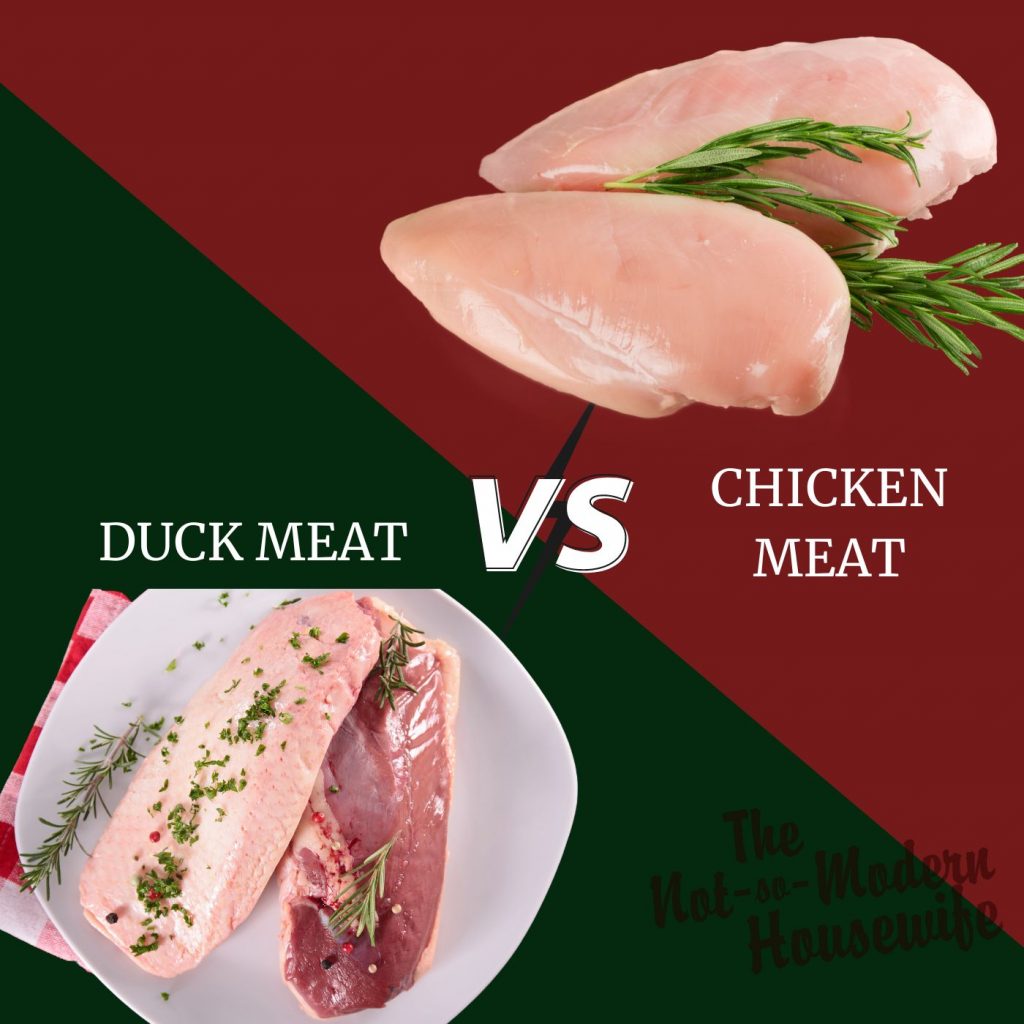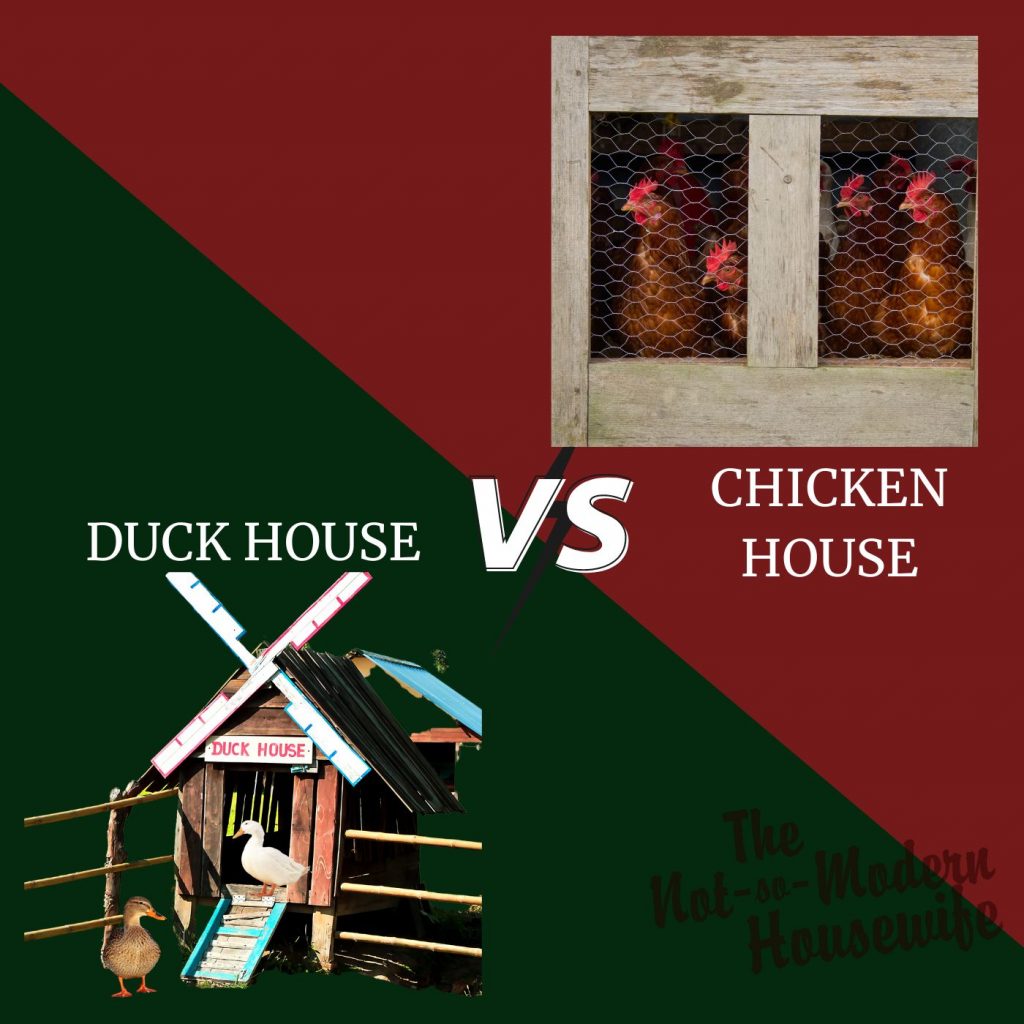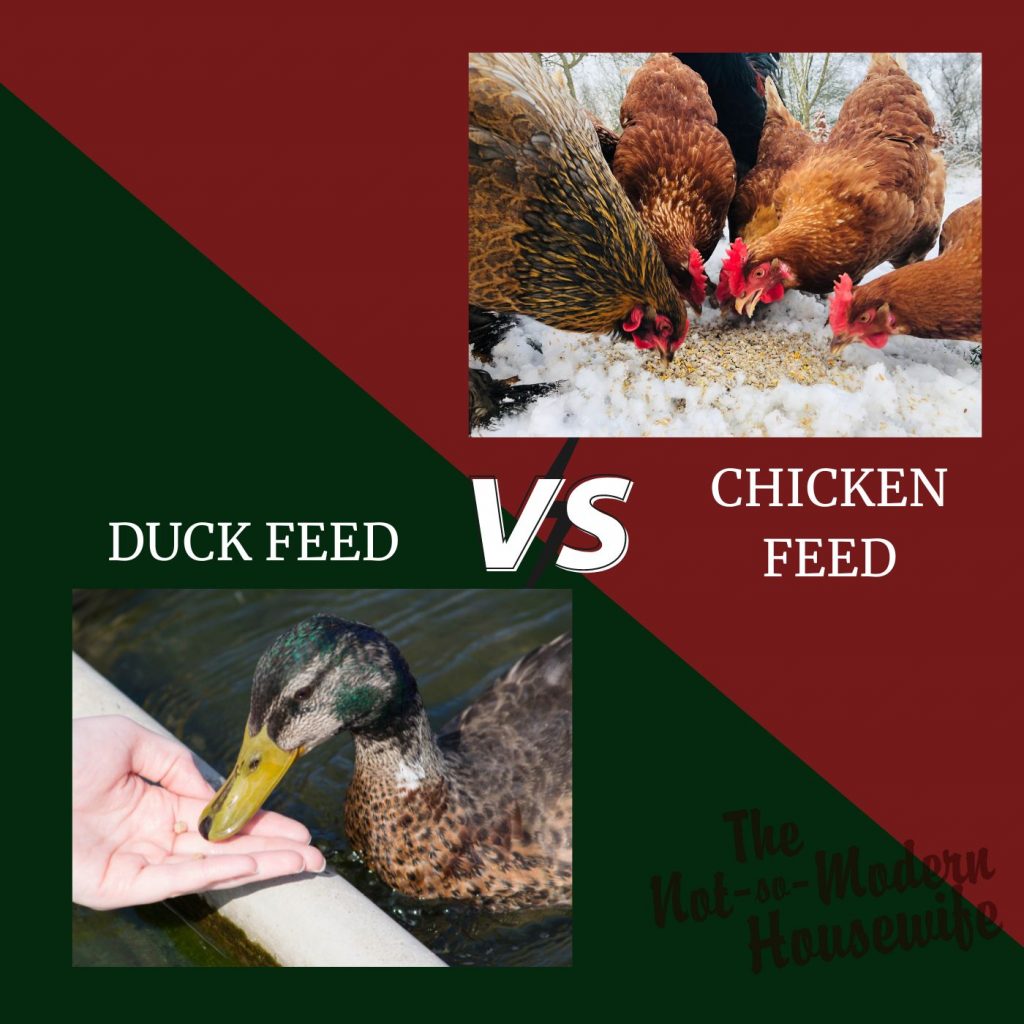Are you trying to decide if you should raise ducks vs chickens on your homestead?
When it comes to backyard poultry, there are many options to choose from. Chickens and ducks are two of the most popular types of birds, but which one is right for you?
This article will explore the advantages and disadvantages of raising chickens and ducks, so you can make an informed decision about which type of bird is best for your needs.

Duck vs Chicken Meat
Chickens are the most popular bird to raise for meat. In fact, chicken is the most popular meat in the world. Duck meat, on the other hand, is considered a delicacy in many cultures.
One of the main reasons people choose to raise chickens over ducks is because they are more familiar with chicken meat. It is more widely available at the grocery store than duck meat. Duck meat can be more difficult to find commercially and is usually more expensive when you do find it.
Ducks are larger than most chicken breeds. This means they will give more meat.
There is a difference between the meat from ducks and chickens. Chicken has both dark and white meat, while duck meat is all dark. However, their nutritional values are similar.
Chicken has a milder flavor than duck meat. Duck meat has a flavor more similar to roast beef. It also has more fat that chicken meat.
Chickens weigh about 4.5 to 6 lbs when they are ready to be processed, while ducks weigh an average of 5.5 lbs. You can get almost the same amount of meat from meat ducks and chickens when butchered at 8 weeks.
However, some duck breeds like Jumbo Pekin, Rouen, Muscovy, and Saxony give more meat if they are allowed more time to grow.
Ducks that are kept for meat are butchered when they are 8 to 12 weeks old. This is a similar age for meat chicken breeds like the Cornish cross.
Ducks and chickens are both raised using similar feed. The process of slaughtering and butchering them is the same, but ducks can be harder to pluck than chickens.

Egg Production
Duck eggs are becoming increasingly popular among backyard homesteaders. Though some may be hesitant to try them, many who do find they prefer the rich flavor of duck eggs to chicken eggs.
When it comes to nutrition, duck eggs pack a serious punch. They contain more fat and cholesterol than chicken eggs, but most of that fat is monounsaturated – meaning it’s actually good for you. Duck eggs also have more fat-soluble vitamins like A, D, E, and K, making them a nutritional powerhouse.
You can learn more about the benefits of duck eggs in my blog post Raising Ducks for Eggs.
Duck eggs are typically larger than chicken eggs and have a thicker shell. This can make them a bit more difficult to crack open. It also makes them difficult to utilize if you like to make hard boiled eggs.
Chickens lay eggs an average of 200 eggs per year during their most productive years. Ducks, however, can lay an average of 180 eggs per year and continue to be a good egg producer beyond 2 years of age.

Housing
Ducks need more space than chickens when it comes to the coop and run. Ducks need 3 to 5 square feet per bird of floor space, while chickens will only need 2 to 3 square feet per bird.
Ducks do not need to roost on bars like other birds. Instead, they will nest on the floor. This can save some space since they won’t need to use a laying box like chickens do. Ducks will simply create their own laying area on the ground.
You need to give ducks at least 15 square feet of space in their run, while chickens only need 8-10 square feet per bird. This is because ducks need more room to flap their wings.
Ducks also need a pool of water to play in. This can be either a small kiddie pool or a small dug-out pond in the run.

Water and Feed for Ducks vs Chickens
Ducks and chickens consume different amounts of grain when they are not allowed to graze on pasture. Ducks will consume 4 to 6 ounces of feed per day while chickens will consume 3.5 to 4 ounces of feed per day.
This means that it will cost more to feed ducks than chickens. However, the cost of feeding ducks can be reduced by letting them free range. Ducks eat a wider variety of plants than chickens do.
Ducks are a great solution for pest control in your garden. They will eat the bugs, leaving your plants alone. If you have enough space, you can let them roam and they won’t need to eat as much grain.
Ducks drink up to 4 cups of water per day, while chickens drink up to 2 cups per day.
Ducks will need water not just to drink but also to keep their eyes and nostrils clean. They will also need water to groom their feathers. This means they will need more water than just what they drink.
You will need to provide clean water for your ducks daily. This can be done by using a small pond or a children’s swimming pool.
Chickens can get all the water they need from drinking and eating grass and bugs. They do not need a separate source of water for bathing like ducks do.
Duck vs. Chicken Environmental Hardiness and Cleanliness
Ducks love water. Water helps them stay hydrated and cool, washes debris from their eyes and nostrils, and helps them digest their food.
Ducks also have more feathers and a special layer of oil under their skin that helps them stay warm in water.
Ducks can be a bit of a challenge to keep clean. They like getting wet and making mud. Their droppings are also more watery than chicken droppings, which can make things messy.
If you provide a plastic baby pool for your ducks, be sure to clean it at least every two days. Ducks will make the pool dirty in just five minutes, so you’ll need to refill it regularly.
Backyard chickens are less messy than ducks. Their droppings are solid and easy to clean up. Chickens also don’t like getting wet, so you won’t have to worry about them making a mess of their water dish.
If you’re looking for a low-maintenance bird, chickens are the way to go. However, if you don’t mind a little extra work, ducks can be a fun addition to your backyard flock.
Health of Ducks vs Chickens
Ducks are known for their resistance to diseases. In fact, they’re more resistant than chickens! This makes them a great choice for farmers looking to keep their animals healthy and disease-free.
Ducklings can tolerate colder temperatures sooner than chicks. This is because they have more feathers, which helps to keep them warm. Ducklings also have a layer of fat that helps to insulate them from the cold.

Which is smarter, a duck or a chicken?
Many poultry keepers believe that ducks are smarter than chickens. For instance, ducks can tell the difference between two people.
Ducks are very food motivated, especially by treats. If one person offers them treats and a second person provides their normal feed, they will become delighted upon seeing the individual with goodies. They will also be able to tell if someone is a stranger.
You can also teach your ducks to respond to their names. Calling your birds by name will elicit a response from them.
Ducks will try to copy their owners. This is called imprinting. Imprinting is when animals learn from their parents how to do things like eat and scratch.
If the owner is there when the ducklings hatch, they will imprint on them. This means that the ducklings will think that their owner is their mother and try to learn from them.
Chickens are not geniuses, but they do have some intelligence. It is important to keep them in a way that provides mental stimulation and enrichment to keep their minds busy.
Chickens are social animals that understand their place in the pecking order. They also communicate with each other, using different vocalizations to convey different types of information.
Research suggests that some chickens may be able to understand numbers to a limited extent. Chickens may also have reasoning skills and the ability to anticipate future events.
Chickens are able to sense the emotions of other chickens. If one chicken is feeling upset, then the others will become upset as well.
Chicken and Duck Foraging Habits and Pest Control
Ducks can help you get rid of slugs, bugs, and weeds from your garden without hurting your plants. However, they love to eat lettuce and strawberries. If you have any garden plants that you don’t want them to eat, it’s best to fence them away from the ducks.
Chickens are notorious for scratching and tearing up gardens. There are some things you can do to prevent this problem. For example, you can use chicken wire to fence off your garden. You can also give your chickens scratch toys to keep them occupied.
Ducks and chickens will both eat bugs and other pests. Chickens will also eat weed seeds, which can help to control the growth of weeds in your garden.
If you have a pond, ducks can help to keep it clean by eating algae. They will also eat mosquito larvae, which can help to reduce the population of mosquitoes around your property.
Ducks and chickens are both able to forage for food. Chickens will typically eat anything they find, including bugs, seeds, and small animals. Ducks are more selective about what they eat and will mostly stick to plants and insects.
Despite their different foraging habits, both ducks and chickens can help to control pests in your garden.
Which makes more noise, chickens or ducks?
This is a tough question to answer since it depends on the individual bird. Some chickens can be quite loud, while some ducks can be very quiet.
All ducks make a quacking noise, except for the Muscovy duck. The Muscovy duck doesn’t make a lot of noise and they are different because they can fly and roost. You will need to fence them in properly though, because they can get out.
Female ducks are actually louder than male ducks or drakes. Females will let out a very distinct, loud quack, while drakes make more of a quiet, raspy sound.
Although roosters have a reputation for being noisy, hens usually remain quiet when they are kept comfortable and safe. Some hens may sing an “egg song” after laying an egg, but this happens infrequently.
Some good chicken breeds to have in your backyard are Buff Orpingtons, Plymouth Rock, Rhode Island Red, Wyandotte, Sussex, Australorp, Brahma, and Silkies because they are known for being quiet.

What if I can’t decide which is better ducks or chickens?
You can always raise both ducks and chickens together! They get along quite well and can even help keep your egg supply steady.
If you opt to raise both ducks and chickens, be sure to give them each their own space. Ducks need a place to swim and preen, so provide them with a kiddie pool or small pond. Chickens also need a place to roost and scratch, so make sure they have a coop or chicken run.
Ducks are a great addition to any backyard flock. They are friendly, economical, and beautiful. However, they do have some unique needs that must be taken into account when raising them. This guide on raising ducks for beginners will discuss some of the most important things you need to know about ducks before bringing them home.
With a little bit of planning, you can have the best of both worlds with ducks and chickens in your backyard!
Conclusion
Ducks and chickens are two of the most popular types of poultry to raise in your backyard. Though they have some similarities, they also have their own unique advantages and disadvantages.
In this article, we explored the pros and cons of raising ducks and chickens so you can make an informed decision about which type of bird is best for you.
Leave a comment and let me know if you chose ducks or chickens.
